Directors' Duties and ASIC v Vizard Case Analysis - BBAL401 2018
VerifiedAdded on 2023/06/10
|6
|1595
|398
Case Study
AI Summary
This case study provides an in-depth analysis of the ASIC v Vizard case, focusing on the duties of a director, specifically concerning the improper use of confidential information obtained during their tenure at Telstra Corporation Limited. Stephen Vizard, a non-executive director, was found to have engaged in share trading activities using privileged information, violating Section 183(1) of the Corporations Act 2001 (Cth). The analysis covers the facts of the case, including the establishment of shell companies to conceal trading activities, relevant laws and principles, and the implications of breaching directors' duties, including civil penalties and disqualification. The study references relevant case law and academic journals to provide a comprehensive understanding of the legal and ethical considerations involved.
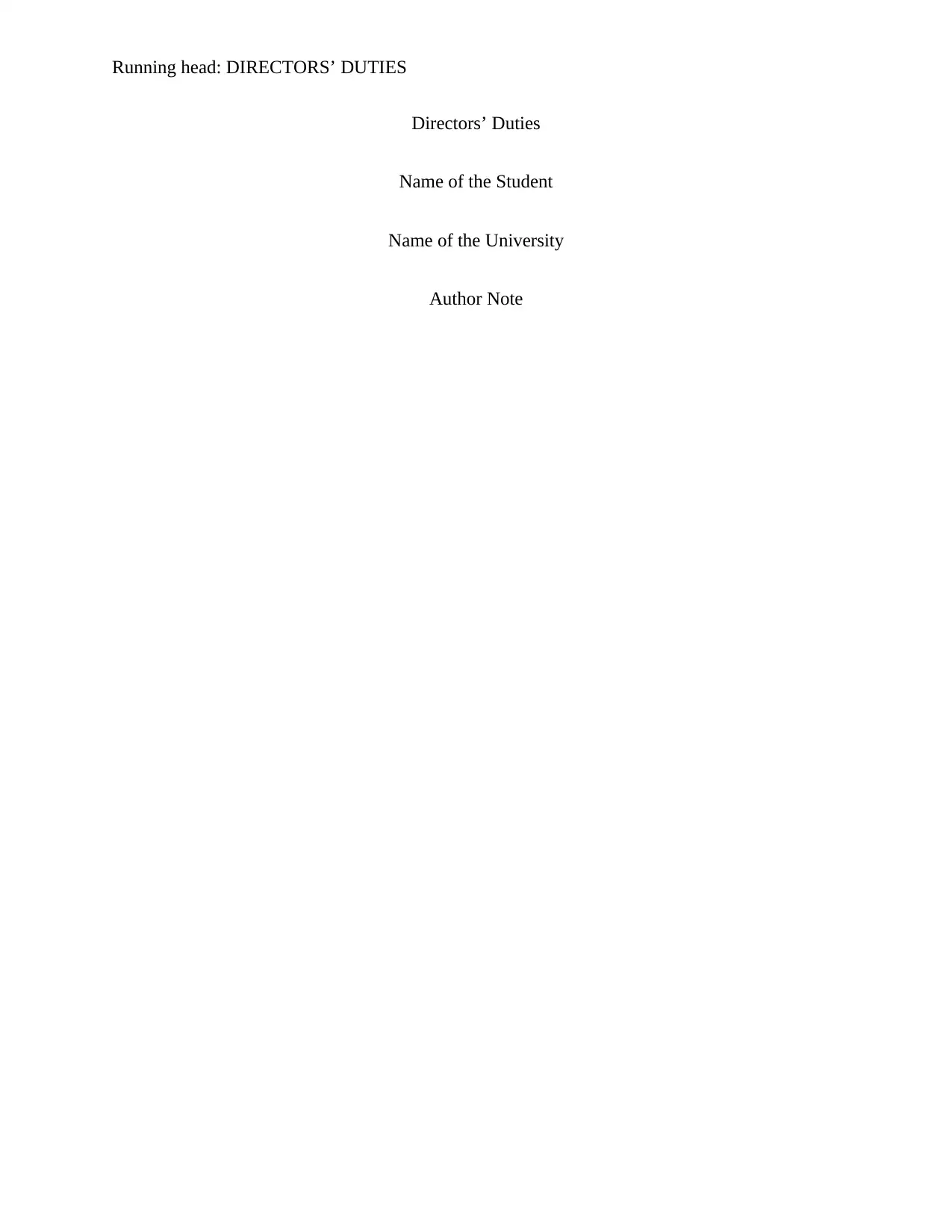
Running head: DIRECTORS’ DUTIES
Directors’ Duties
Name of the Student
Name of the University
Author Note
Directors’ Duties
Name of the Student
Name of the University
Author Note
Paraphrase This Document
Need a fresh take? Get an instant paraphrase of this document with our AI Paraphraser
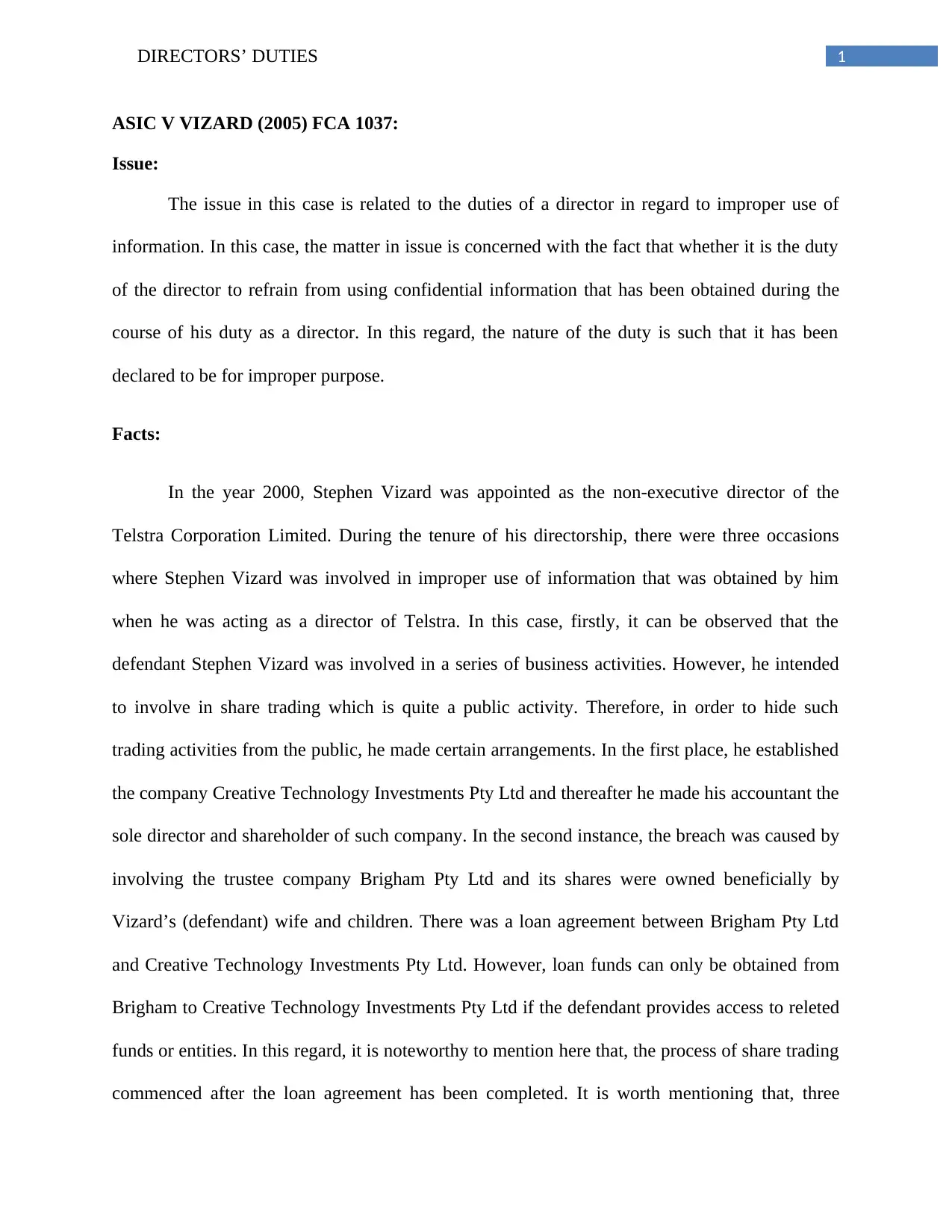
1DIRECTORS’ DUTIES
ASIC V VIZARD (2005) FCA 1037:
Issue:
The issue in this case is related to the duties of a director in regard to improper use of
information. In this case, the matter in issue is concerned with the fact that whether it is the duty
of the director to refrain from using confidential information that has been obtained during the
course of his duty as a director. In this regard, the nature of the duty is such that it has been
declared to be for improper purpose.
Facts:
In the year 2000, Stephen Vizard was appointed as the non-executive director of the
Telstra Corporation Limited. During the tenure of his directorship, there were three occasions
where Stephen Vizard was involved in improper use of information that was obtained by him
when he was acting as a director of Telstra. In this case, firstly, it can be observed that the
defendant Stephen Vizard was involved in a series of business activities. However, he intended
to involve in share trading which is quite a public activity. Therefore, in order to hide such
trading activities from the public, he made certain arrangements. In the first place, he established
the company Creative Technology Investments Pty Ltd and thereafter he made his accountant the
sole director and shareholder of such company. In the second instance, the breach was caused by
involving the trustee company Brigham Pty Ltd and its shares were owned beneficially by
Vizard’s (defendant) wife and children. There was a loan agreement between Brigham Pty Ltd
and Creative Technology Investments Pty Ltd. However, loan funds can only be obtained from
Brigham to Creative Technology Investments Pty Ltd if the defendant provides access to releted
funds or entities. In this regard, it is noteworthy to mention here that, the process of share trading
commenced after the loan agreement has been completed. It is worth mentioning that, three
ASIC V VIZARD (2005) FCA 1037:
Issue:
The issue in this case is related to the duties of a director in regard to improper use of
information. In this case, the matter in issue is concerned with the fact that whether it is the duty
of the director to refrain from using confidential information that has been obtained during the
course of his duty as a director. In this regard, the nature of the duty is such that it has been
declared to be for improper purpose.
Facts:
In the year 2000, Stephen Vizard was appointed as the non-executive director of the
Telstra Corporation Limited. During the tenure of his directorship, there were three occasions
where Stephen Vizard was involved in improper use of information that was obtained by him
when he was acting as a director of Telstra. In this case, firstly, it can be observed that the
defendant Stephen Vizard was involved in a series of business activities. However, he intended
to involve in share trading which is quite a public activity. Therefore, in order to hide such
trading activities from the public, he made certain arrangements. In the first place, he established
the company Creative Technology Investments Pty Ltd and thereafter he made his accountant the
sole director and shareholder of such company. In the second instance, the breach was caused by
involving the trustee company Brigham Pty Ltd and its shares were owned beneficially by
Vizard’s (defendant) wife and children. There was a loan agreement between Brigham Pty Ltd
and Creative Technology Investments Pty Ltd. However, loan funds can only be obtained from
Brigham to Creative Technology Investments Pty Ltd if the defendant provides access to releted
funds or entities. In this regard, it is noteworthy to mention here that, the process of share trading
commenced after the loan agreement has been completed. It is worth mentioning that, three
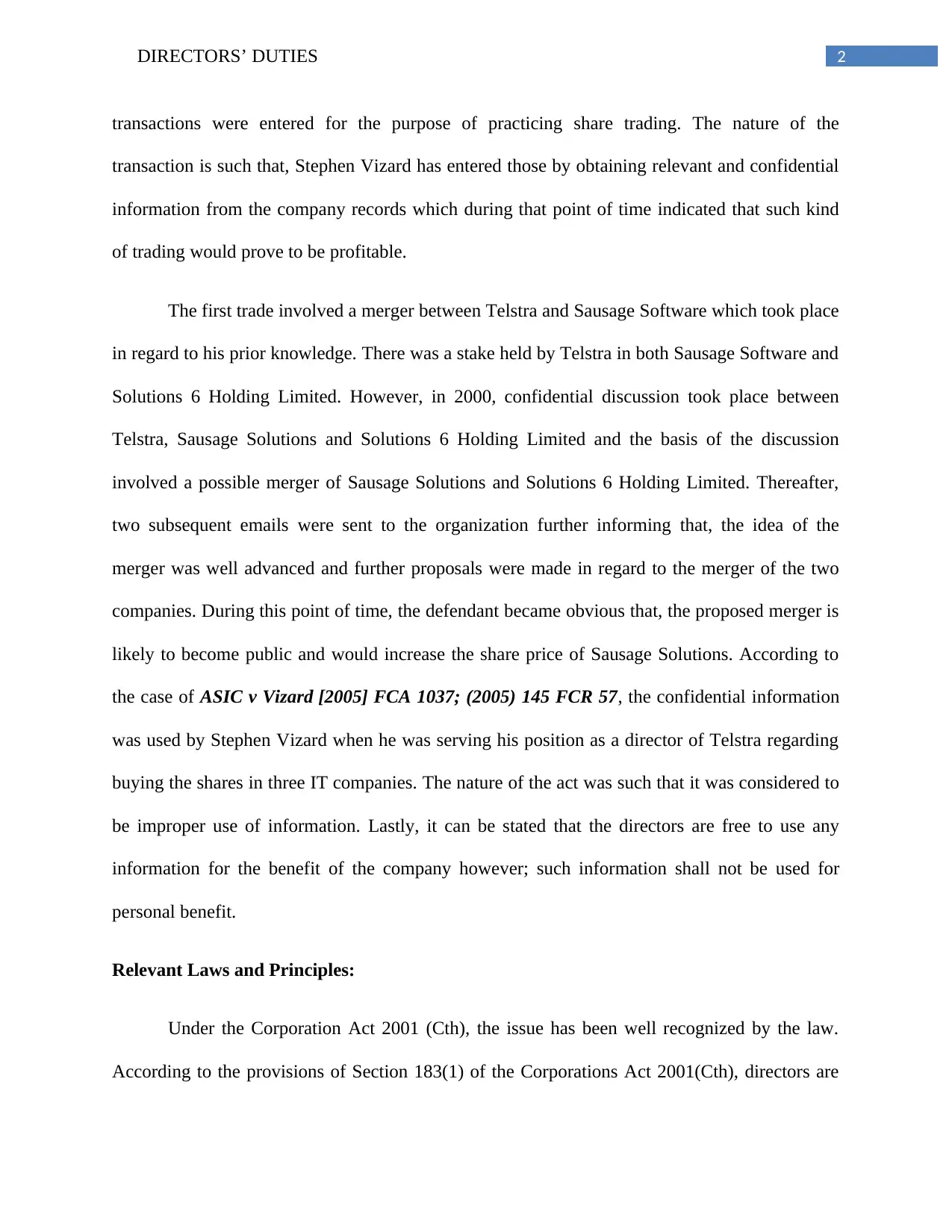
2DIRECTORS’ DUTIES
transactions were entered for the purpose of practicing share trading. The nature of the
transaction is such that, Stephen Vizard has entered those by obtaining relevant and confidential
information from the company records which during that point of time indicated that such kind
of trading would prove to be profitable.
The first trade involved a merger between Telstra and Sausage Software which took place
in regard to his prior knowledge. There was a stake held by Telstra in both Sausage Software and
Solutions 6 Holding Limited. However, in 2000, confidential discussion took place between
Telstra, Sausage Solutions and Solutions 6 Holding Limited and the basis of the discussion
involved a possible merger of Sausage Solutions and Solutions 6 Holding Limited. Thereafter,
two subsequent emails were sent to the organization further informing that, the idea of the
merger was well advanced and further proposals were made in regard to the merger of the two
companies. During this point of time, the defendant became obvious that, the proposed merger is
likely to become public and would increase the share price of Sausage Solutions. According to
the case of ASIC v Vizard [2005] FCA 1037; (2005) 145 FCR 57, the confidential information
was used by Stephen Vizard when he was serving his position as a director of Telstra regarding
buying the shares in three IT companies. The nature of the act was such that it was considered to
be improper use of information. Lastly, it can be stated that the directors are free to use any
information for the benefit of the company however; such information shall not be used for
personal benefit.
Relevant Laws and Principles:
Under the Corporation Act 2001 (Cth), the issue has been well recognized by the law.
According to the provisions of Section 183(1) of the Corporations Act 2001(Cth), directors are
transactions were entered for the purpose of practicing share trading. The nature of the
transaction is such that, Stephen Vizard has entered those by obtaining relevant and confidential
information from the company records which during that point of time indicated that such kind
of trading would prove to be profitable.
The first trade involved a merger between Telstra and Sausage Software which took place
in regard to his prior knowledge. There was a stake held by Telstra in both Sausage Software and
Solutions 6 Holding Limited. However, in 2000, confidential discussion took place between
Telstra, Sausage Solutions and Solutions 6 Holding Limited and the basis of the discussion
involved a possible merger of Sausage Solutions and Solutions 6 Holding Limited. Thereafter,
two subsequent emails were sent to the organization further informing that, the idea of the
merger was well advanced and further proposals were made in regard to the merger of the two
companies. During this point of time, the defendant became obvious that, the proposed merger is
likely to become public and would increase the share price of Sausage Solutions. According to
the case of ASIC v Vizard [2005] FCA 1037; (2005) 145 FCR 57, the confidential information
was used by Stephen Vizard when he was serving his position as a director of Telstra regarding
buying the shares in three IT companies. The nature of the act was such that it was considered to
be improper use of information. Lastly, it can be stated that the directors are free to use any
information for the benefit of the company however; such information shall not be used for
personal benefit.
Relevant Laws and Principles:
Under the Corporation Act 2001 (Cth), the issue has been well recognized by the law.
According to the provisions of Section 183(1) of the Corporations Act 2001(Cth), directors are
⊘ This is a preview!⊘
Do you want full access?
Subscribe today to unlock all pages.

Trusted by 1+ million students worldwide
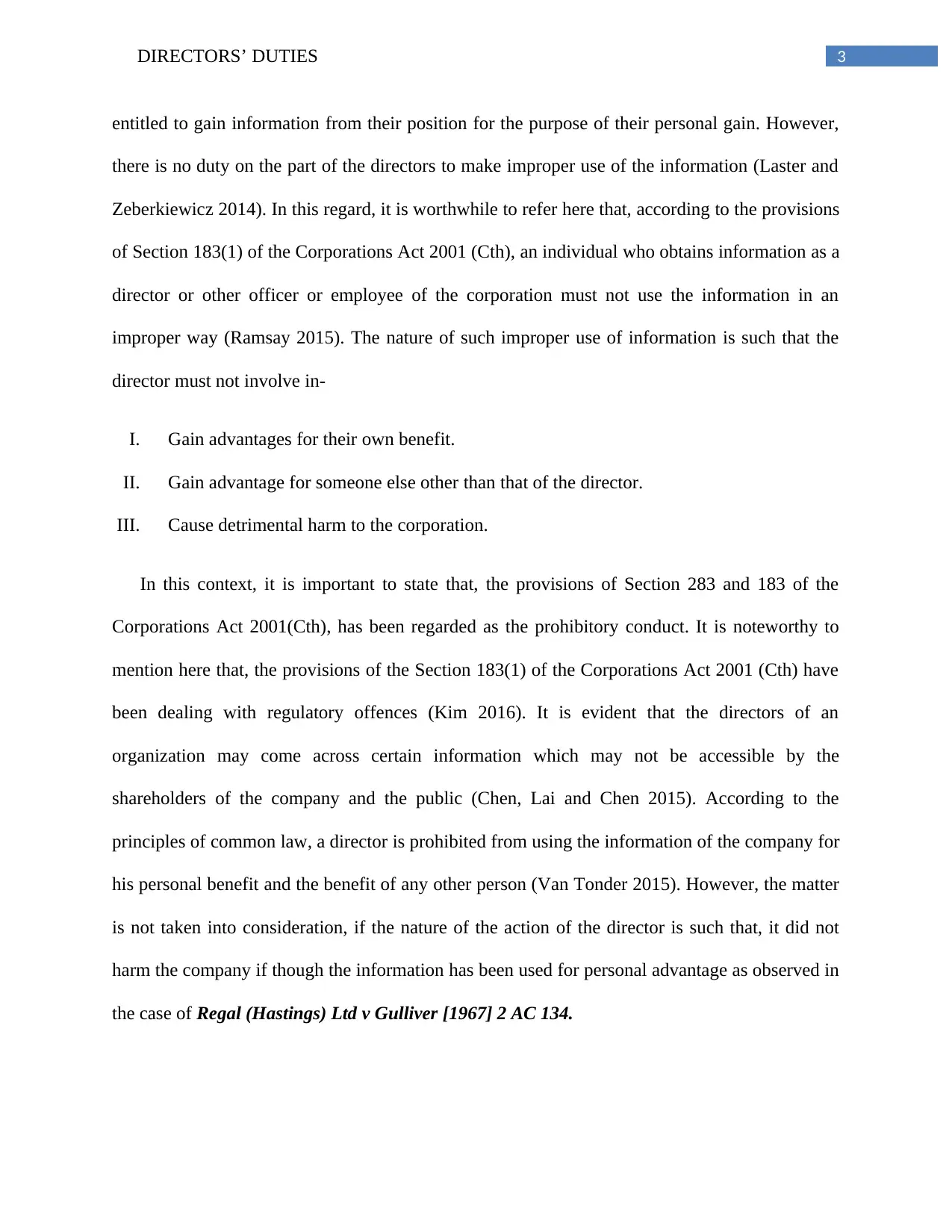
3DIRECTORS’ DUTIES
entitled to gain information from their position for the purpose of their personal gain. However,
there is no duty on the part of the directors to make improper use of the information (Laster and
Zeberkiewicz 2014). In this regard, it is worthwhile to refer here that, according to the provisions
of Section 183(1) of the Corporations Act 2001 (Cth), an individual who obtains information as a
director or other officer or employee of the corporation must not use the information in an
improper way (Ramsay 2015). The nature of such improper use of information is such that the
director must not involve in-
I. Gain advantages for their own benefit.
II. Gain advantage for someone else other than that of the director.
III. Cause detrimental harm to the corporation.
In this context, it is important to state that, the provisions of Section 283 and 183 of the
Corporations Act 2001(Cth), has been regarded as the prohibitory conduct. It is noteworthy to
mention here that, the provisions of the Section 183(1) of the Corporations Act 2001 (Cth) have
been dealing with regulatory offences (Kim 2016). It is evident that the directors of an
organization may come across certain information which may not be accessible by the
shareholders of the company and the public (Chen, Lai and Chen 2015). According to the
principles of common law, a director is prohibited from using the information of the company for
his personal benefit and the benefit of any other person (Van Tonder 2015). However, the matter
is not taken into consideration, if the nature of the action of the director is such that, it did not
harm the company if though the information has been used for personal advantage as observed in
the case of Regal (Hastings) Ltd v Gulliver [1967] 2 AC 134.
entitled to gain information from their position for the purpose of their personal gain. However,
there is no duty on the part of the directors to make improper use of the information (Laster and
Zeberkiewicz 2014). In this regard, it is worthwhile to refer here that, according to the provisions
of Section 183(1) of the Corporations Act 2001 (Cth), an individual who obtains information as a
director or other officer or employee of the corporation must not use the information in an
improper way (Ramsay 2015). The nature of such improper use of information is such that the
director must not involve in-
I. Gain advantages for their own benefit.
II. Gain advantage for someone else other than that of the director.
III. Cause detrimental harm to the corporation.
In this context, it is important to state that, the provisions of Section 283 and 183 of the
Corporations Act 2001(Cth), has been regarded as the prohibitory conduct. It is noteworthy to
mention here that, the provisions of the Section 183(1) of the Corporations Act 2001 (Cth) have
been dealing with regulatory offences (Kim 2016). It is evident that the directors of an
organization may come across certain information which may not be accessible by the
shareholders of the company and the public (Chen, Lai and Chen 2015). According to the
principles of common law, a director is prohibited from using the information of the company for
his personal benefit and the benefit of any other person (Van Tonder 2015). However, the matter
is not taken into consideration, if the nature of the action of the director is such that, it did not
harm the company if though the information has been used for personal advantage as observed in
the case of Regal (Hastings) Ltd v Gulliver [1967] 2 AC 134.
Paraphrase This Document
Need a fresh take? Get an instant paraphrase of this document with our AI Paraphraser
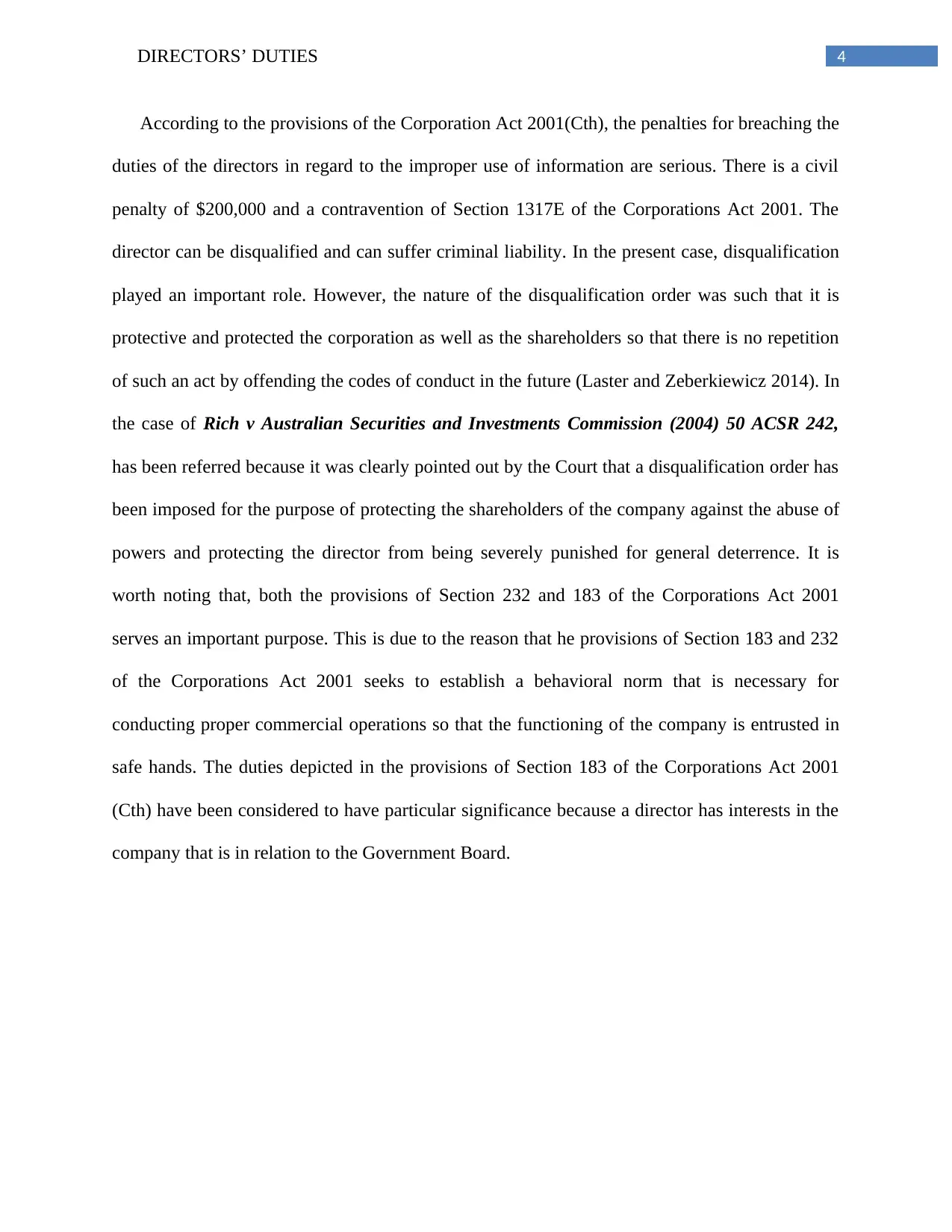
4DIRECTORS’ DUTIES
According to the provisions of the Corporation Act 2001(Cth), the penalties for breaching the
duties of the directors in regard to the improper use of information are serious. There is a civil
penalty of $200,000 and a contravention of Section 1317E of the Corporations Act 2001. The
director can be disqualified and can suffer criminal liability. In the present case, disqualification
played an important role. However, the nature of the disqualification order was such that it is
protective and protected the corporation as well as the shareholders so that there is no repetition
of such an act by offending the codes of conduct in the future (Laster and Zeberkiewicz 2014). In
the case of Rich v Australian Securities and Investments Commission (2004) 50 ACSR 242,
has been referred because it was clearly pointed out by the Court that a disqualification order has
been imposed for the purpose of protecting the shareholders of the company against the abuse of
powers and protecting the director from being severely punished for general deterrence. It is
worth noting that, both the provisions of Section 232 and 183 of the Corporations Act 2001
serves an important purpose. This is due to the reason that he provisions of Section 183 and 232
of the Corporations Act 2001 seeks to establish a behavioral norm that is necessary for
conducting proper commercial operations so that the functioning of the company is entrusted in
safe hands. The duties depicted in the provisions of Section 183 of the Corporations Act 2001
(Cth) have been considered to have particular significance because a director has interests in the
company that is in relation to the Government Board.
According to the provisions of the Corporation Act 2001(Cth), the penalties for breaching the
duties of the directors in regard to the improper use of information are serious. There is a civil
penalty of $200,000 and a contravention of Section 1317E of the Corporations Act 2001. The
director can be disqualified and can suffer criminal liability. In the present case, disqualification
played an important role. However, the nature of the disqualification order was such that it is
protective and protected the corporation as well as the shareholders so that there is no repetition
of such an act by offending the codes of conduct in the future (Laster and Zeberkiewicz 2014). In
the case of Rich v Australian Securities and Investments Commission (2004) 50 ACSR 242,
has been referred because it was clearly pointed out by the Court that a disqualification order has
been imposed for the purpose of protecting the shareholders of the company against the abuse of
powers and protecting the director from being severely punished for general deterrence. It is
worth noting that, both the provisions of Section 232 and 183 of the Corporations Act 2001
serves an important purpose. This is due to the reason that he provisions of Section 183 and 232
of the Corporations Act 2001 seeks to establish a behavioral norm that is necessary for
conducting proper commercial operations so that the functioning of the company is entrusted in
safe hands. The duties depicted in the provisions of Section 183 of the Corporations Act 2001
(Cth) have been considered to have particular significance because a director has interests in the
company that is in relation to the Government Board.
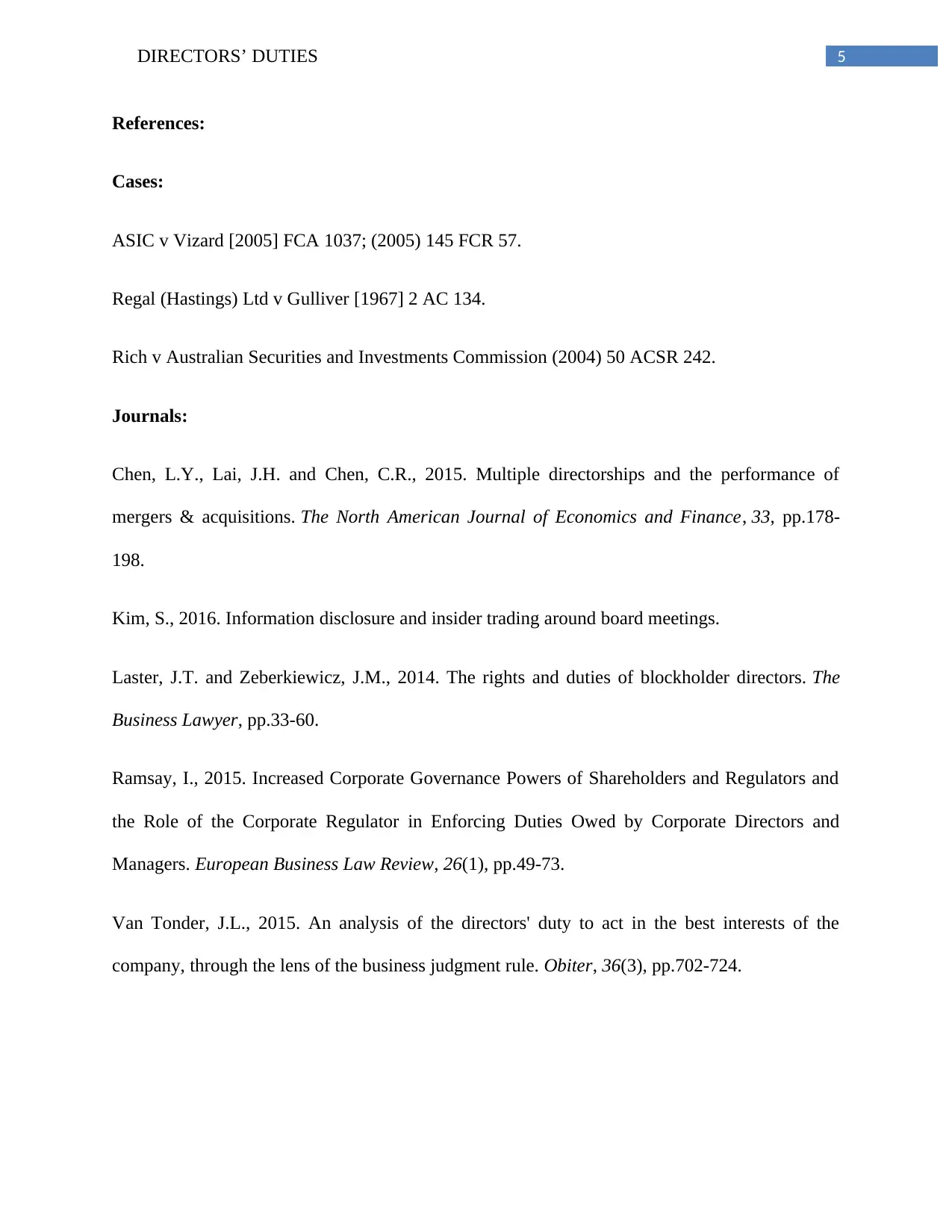
5DIRECTORS’ DUTIES
References:
Cases:
ASIC v Vizard [2005] FCA 1037; (2005) 145 FCR 57.
Regal (Hastings) Ltd v Gulliver [1967] 2 AC 134.
Rich v Australian Securities and Investments Commission (2004) 50 ACSR 242.
Journals:
Chen, L.Y., Lai, J.H. and Chen, C.R., 2015. Multiple directorships and the performance of
mergers & acquisitions. The North American Journal of Economics and Finance, 33, pp.178-
198.
Kim, S., 2016. Information disclosure and insider trading around board meetings.
Laster, J.T. and Zeberkiewicz, J.M., 2014. The rights and duties of blockholder directors. The
Business Lawyer, pp.33-60.
Ramsay, I., 2015. Increased Corporate Governance Powers of Shareholders and Regulators and
the Role of the Corporate Regulator in Enforcing Duties Owed by Corporate Directors and
Managers. European Business Law Review, 26(1), pp.49-73.
Van Tonder, J.L., 2015. An analysis of the directors' duty to act in the best interests of the
company, through the lens of the business judgment rule. Obiter, 36(3), pp.702-724.
References:
Cases:
ASIC v Vizard [2005] FCA 1037; (2005) 145 FCR 57.
Regal (Hastings) Ltd v Gulliver [1967] 2 AC 134.
Rich v Australian Securities and Investments Commission (2004) 50 ACSR 242.
Journals:
Chen, L.Y., Lai, J.H. and Chen, C.R., 2015. Multiple directorships and the performance of
mergers & acquisitions. The North American Journal of Economics and Finance, 33, pp.178-
198.
Kim, S., 2016. Information disclosure and insider trading around board meetings.
Laster, J.T. and Zeberkiewicz, J.M., 2014. The rights and duties of blockholder directors. The
Business Lawyer, pp.33-60.
Ramsay, I., 2015. Increased Corporate Governance Powers of Shareholders and Regulators and
the Role of the Corporate Regulator in Enforcing Duties Owed by Corporate Directors and
Managers. European Business Law Review, 26(1), pp.49-73.
Van Tonder, J.L., 2015. An analysis of the directors' duty to act in the best interests of the
company, through the lens of the business judgment rule. Obiter, 36(3), pp.702-724.
⊘ This is a preview!⊘
Do you want full access?
Subscribe today to unlock all pages.

Trusted by 1+ million students worldwide
1 out of 6
Your All-in-One AI-Powered Toolkit for Academic Success.
+13062052269
info@desklib.com
Available 24*7 on WhatsApp / Email
![[object Object]](/_next/static/media/star-bottom.7253800d.svg)
Unlock your academic potential
Copyright © 2020–2025 A2Z Services. All Rights Reserved. Developed and managed by ZUCOL.


